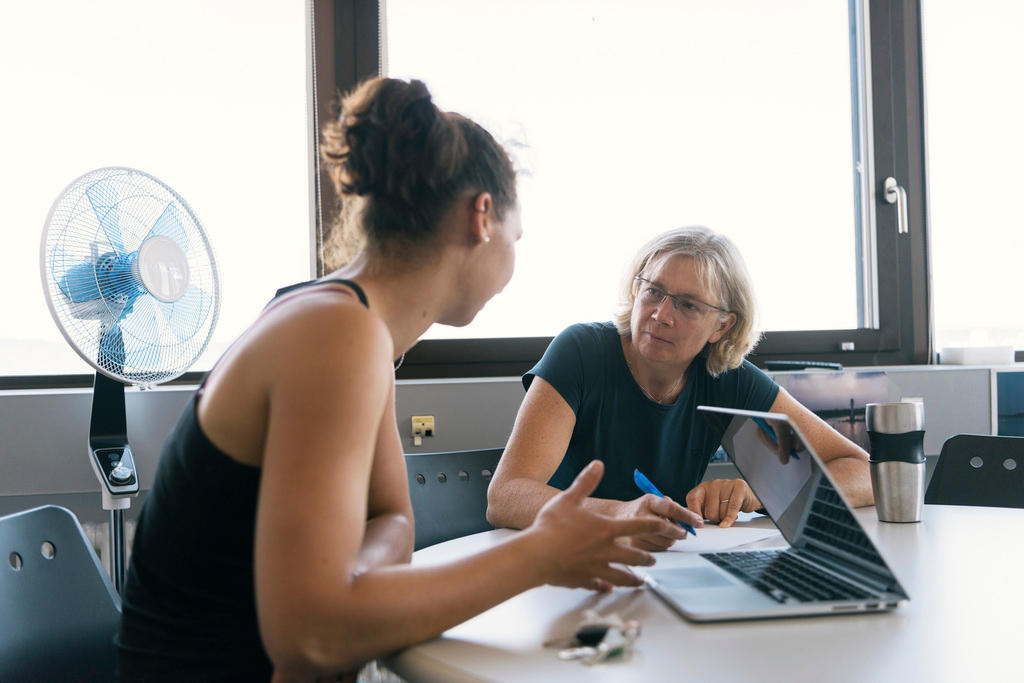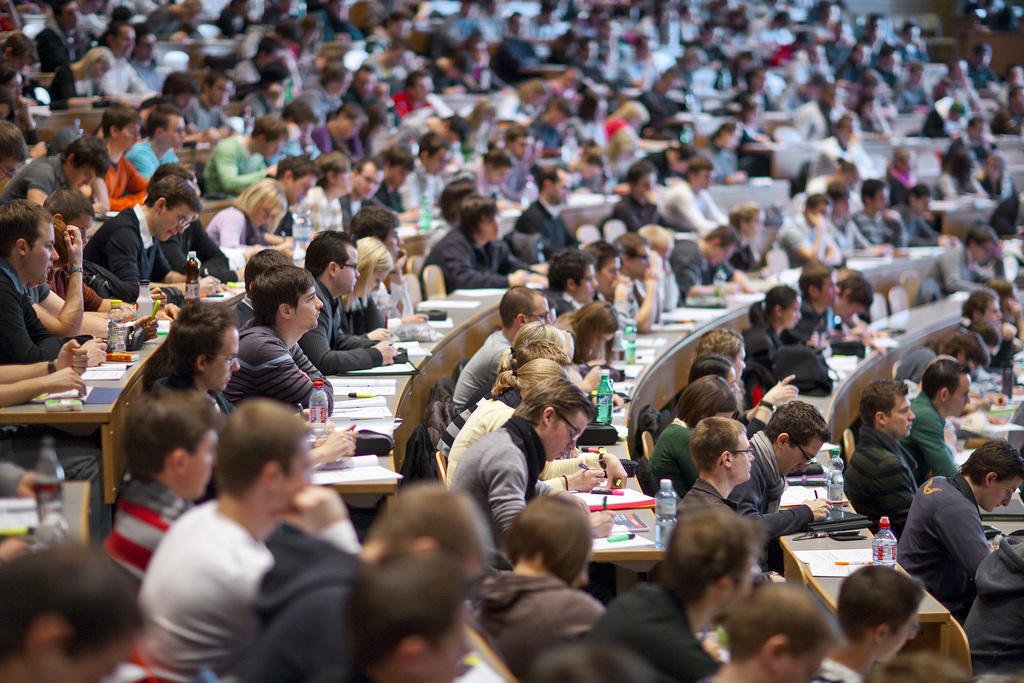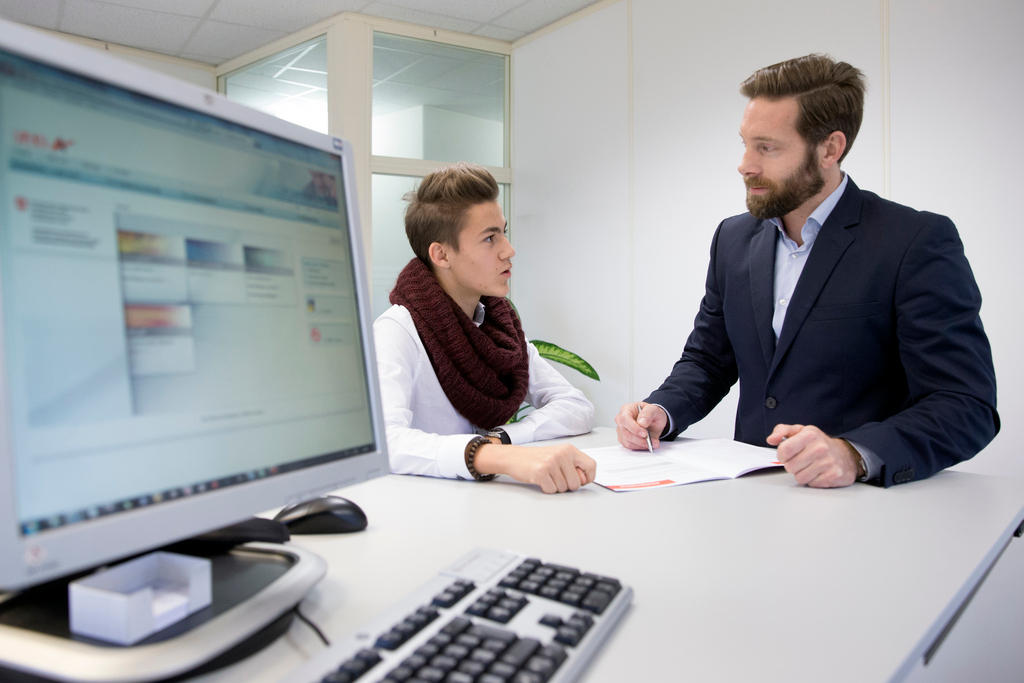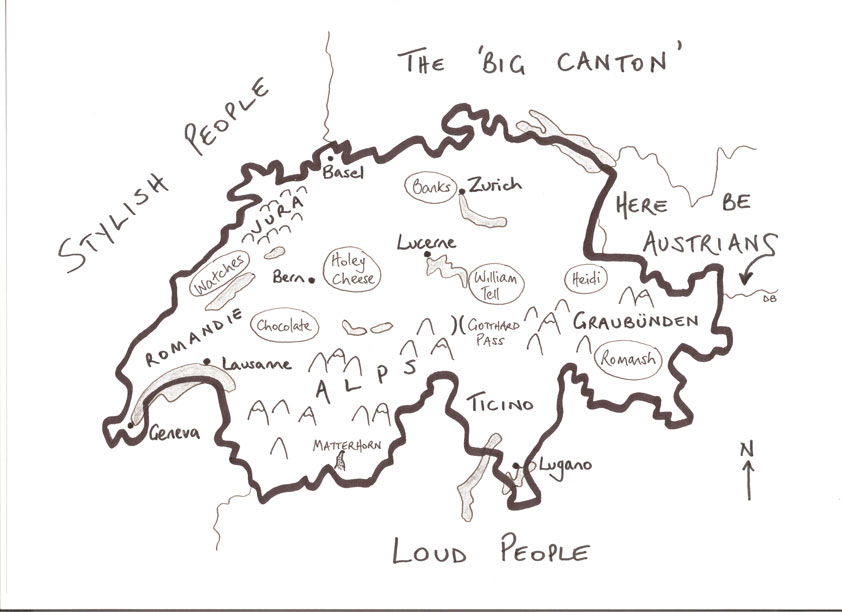‘There’s a different Switzerland for whoever you ask’

Life can be challenging for exchange students in Switzerland, having to navigate not only academic differences but also the quirks of Swiss daily life. A course at the University of Zurich gives a deeper understanding of the country from an anthropological point of view.
“In Switzerland for IncomingsExternal link we don’t look at Switzerland as tourists or as businesspeople exploring the country but from a special angle that is based on our disciplines,” explains Juliane NeuhausExternal link, one of the three academics giving the multi-disciplinary module.
“Cultural anthropology looks at what people do as they go about their daily lives. It questions stereotypes. It looks at questions of identity – for example, how are groups within one society like Switzerland composed and how are they bound together?”
Shadya, a business/social sciences student from the Netherlands who is taking the Switzerland for Incomings course, says she was interested in “how foreigners experience Switzerland but also how the Swiss look at their own country”.
She found Switzerland to be a lot more diverse – in languages, nationalities and people – than she initially thought. “Switzerland is more than only mountains, banks and a ‘perfect lifestyle’,” she said.
Joshua, an Australian studying German, is interested in the differences in cultural aspects such as festivals or celebrations that exist between different Swiss cantons. “Also the length and process which it takes to acquire Swiss citizenship as a migrant or even at birth if you have migrant parents.”

More
University exchange programmes
He says the course has made him consider political, cultural and everyday differences between Switzerland and his home. “I’ll definitely be taking these cultural differences back with me.”
How does it work?
As part of the classes, which run from mid-September to Christmas and are taught in English, students read and discuss texts relating to Switzerland in the areas of cultural studies and social anthropology. They also visit urban locations – for example Zurich’s SechseläutenplatzExternal link – to people-watch and observe Swiss daily life.
Neuhaus remembers how one student, who had already been in Switzerland for a semester, told her: “That’s such a touristy place.” “Well, let’s have a look,” she replied.
In peer groups, the students prepared what to observe systematically and headed down to Sechseläutenplatz, Zurich’s largest square, on a Monday morning to see who was there and what they were doing.
“A lot of people were going to the lakeside and running. There were a lot of nannies with children. There were people going to work in the opera or buying tickets in the Opera House and coming back out. There were a lot of workers because it was the day after the Zurich Film Festival,” Neuhaus says.
“Discussing their observations, the students concluded it wasn’t touristy – or not just touristy.”
In addition to systematic observation, the students learn other ethnographic methods such as conducting interviews and photo-ethnography, in which they represent other cultures visually and interpret the results. They also use a non-public blog to share the results of their research, to prepare for subsequent discussions and to receive feedback.
Questioning the stereotypes
Neuhaus asked the students to quickly write down what came to their minds when they thought about Switzerland.
“It wasn’t the Alps or cows or lakes, but it was tidiness, efficiency, wealth – things like that. We then read a text about how images about Switzerland emerged over the centuries and how they are what’s important when you look at Switzerland today. So we actually question the images that exist and the stereotypes.”
“We’re really trying to go beyond the clichés and whether there’s a real and not real Switzerland – because it’s all a construction,” says Yonca KrahnExternal link, another course instructor, also from the university’s department of social anthropology and cultural studies.
“We deal with questions of authenticity. Our idea of Switzerland always depends on where we come from, in what culture we’ve been raised and how we approach this concept of the real Switzerland. There’s a different Switzerland for whoever you ask.”
Krahn says one Spanish student did her photo-ethnography exercise on tram stops.
“She was looking at how people were crossing the street and she realised that people don’t use the zebra crossings – although they are everywhere at the tram tracks. People just cross however they like, in front of cars and across the tracks,” she says.
“The student said she thought Swiss people would be much more correct and follow the rules. But the photo-ethnography helped her to understand that there are all different sorts of practices.”
Cultural lenses
In teaching students from all over the world, Krahn has made some observations of her own. For example, she’s found that many of them – “especially students from universities with high study fees” – are used to a different university system in which the lecturers and tutors do a lot more for the students.
“I think the mentality of being a student, when you come from a country where you pay lots of money for being a student, is a mentality I haven’t seen with the Swiss students or students who do their whole studies in Switzerland,” she says. For example, Swiss students tend to turn to colleagues for help with a course or assignment before going to their professor, she noted.
The organisers say benefits of the course’s blended learningExternal link approach to education include improved team-building and English language skills as well as the chance to practise digital publishing, via the blog.
“By having this course, which introduces these fieldwork strategies and everything else, students develop a skill of being maybe more aware of new cultures and traditions and of understanding what they are looking at without being too influenced by their own background,” Krahn says.
Alicia from Germany, whose main subject in Zurich is popular culture studies, particularly liked the presentations of the photo-ethnography projects “because it showed the different personal perspectives of the students from all over the world on specific observations here in Switzerland”.
In Germany Alicia is studying primary school teaching with German, maths and PE. She doesn’t think her approach to her other subjects has changed completely, “but I understood how observations can be influenced in different aspects by the observer or by other factors. I also noticed how much the cultural background of people can shape the interpretation of any situation. So now I try to be more self-reflective and try not to assess situations immediately in my daily life”.
‘Switzerland for Incomings’
Switzerland for Incomings, which is given in English, is being taken this year by 15 students from a wide range of disciplines and from all over the world. Neuhaus explains that they do not take a large group of students in order to teach them well and to have close contacts, allowing them to work in peer groups.
Not all students have English as a first language, “but what is common is that many of them don’t speak German”, Neuhaus said.
So will Switzerland for Incomings return for a third year? The project has been funded for two years by the University of Zurich’s Lehrkredit/Teaching FundExternal link. This ends in 2020 and Neuhaus said they do not expect further funding. “But it would be great if the University of Zurich would enforce its ‘internationalising strategy’ by funding courses such as ours,” she said.
“It’s really fun teaching this class!”

More
How great is the student experience at a Swiss university?

In compliance with the JTI standards
More: SWI swissinfo.ch certified by the Journalism Trust Initiative


















You can find an overview of ongoing debates with our journalists here . Please join us!
If you want to start a conversation about a topic raised in this article or want to report factual errors, email us at english@swissinfo.ch.